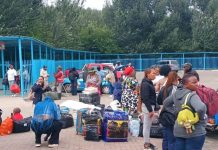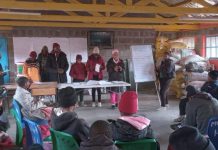Africa-Press – Lesotho. LIOPELO* is just 13-years old but is already a “mother” to her three siblings. Every morning, Liopelo prepares a meal for all of them, prepares them for school before making a beeline for school.
The youngest is three years and goes to a nearby crèche. When her parents died last year at different intervals, Liopelo was only a child. “When my father first passed away, I saw how my mother struggled thereafter.
Her struggle in raising us as a single parent was short-lived when she also passed on months later. I was broken,” she said. She had no choice but to quickly grow-up and play mother to her siblings with whom she shares a single, dilapidated room.
Members of her extended family are not willing to live and take care of the orphans, leaving Liopelo to head the household. The closure of schools has made the situation worse. The closure of schools means many children who relied on school feeding programmes are going hungry. These include Liopelo and her siblings.
When Liopelo runs out of ideas on what to feed the family, she goes around the neighbourhood asking for small quantities of basic food items such as maize-meal, salt and leaves of moroho.
“Sometimes they (neighbours) are able to help, and sometimes they are not,” said Liopelo says.
This week, joy filled Liopelo’s face when her family received food parcels from World Vision together with more than 800 other beneficiaries in ‘Mate.
According to ’Mathapelo Letho, the councillor for Menkhoaneng 37 of the beneficiaries are child-headed families. “Most of these children are 16 and 17 years old while others are younger than that,” Letho told thepost.
She described the poverty in the area as “devastating”. Although the majority of the poverty-stricken households receive assistance from the ministry of social development, the help is often inadequate to meet their basic needs.
“The money comes quarterly and food has become expensive,” she said.
She said some families were struggling because family members who used to work in South Africa are out of jobs due to the coronavirus linked lockdown.
“These are trying times for everyone. Businesses are failing and families are struggling, we all need to treat each other with care and courtesy,” Letho said.
’Mate chief, Selebalo, said the pandemic “has made everyone vulnerable and everyone hungry”.
“We have been accused of choosing beneficiaries unfairly when we submit names to donors,” Chief Selebalo said.
Chief Selebalo said child headed families are a priority. “They are on our priority list because they are the most vulnerable,” he said. Beneficiaries of the World Vision programme received maize meal, bread flour, cooking oil and tinned fish. According to UNICEF, more than 80 000 families are caring for orphans and other vulnerable children in Lesotho.






